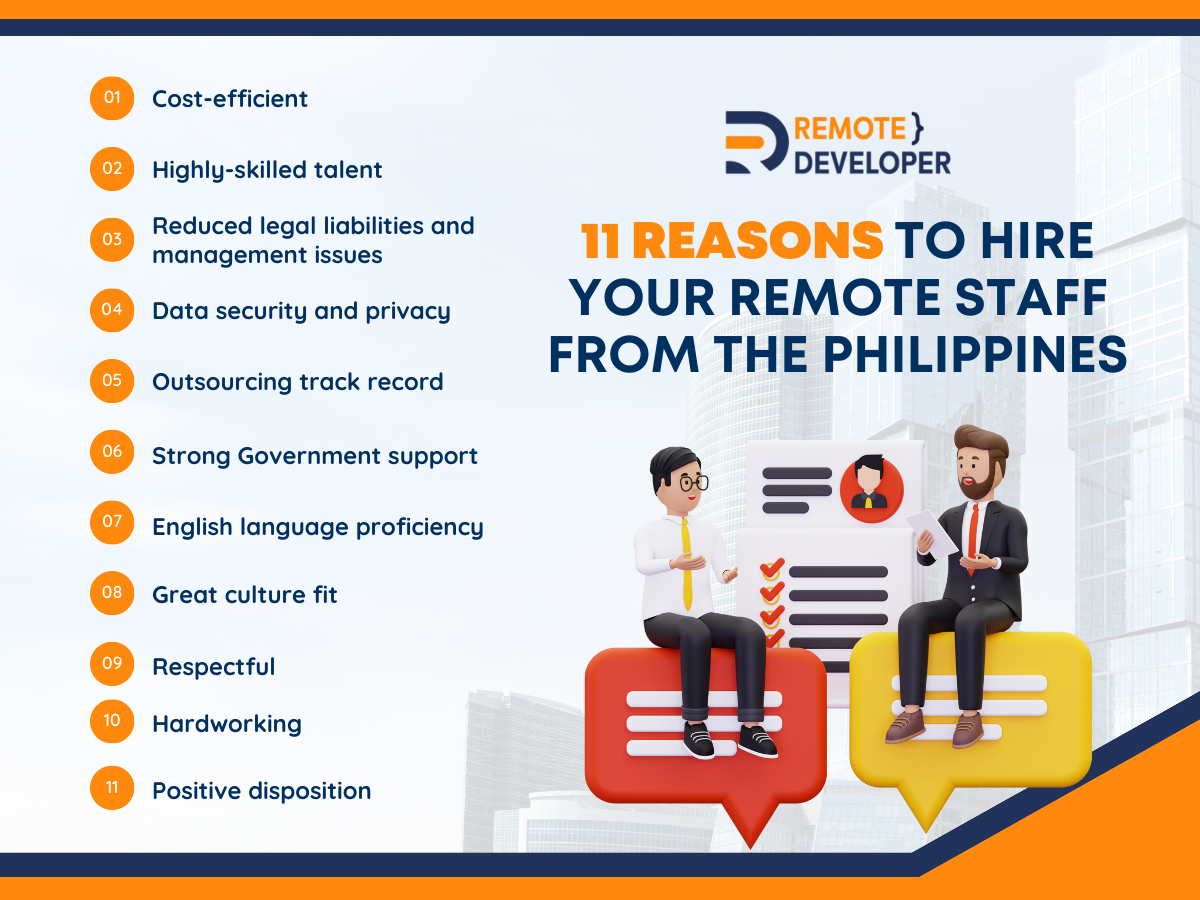The Philippines is one of the known premier outsourcing destinations in the world. Three decades of a thriving industry, a continuous influx of international investors, and thousands of companies working with a remote Filipino staff speak for themselves already.
But why is the Philippines’ offshoring industry considered a top choice worldwide?
Well, why not?
In this article, we listed the reasons that have attracted startups, small to medium enterprises, and large companies from around the world to hire their remote staff from the Philippines.
The Philippines
Since outsourcing was introduced in the country back in 1992, the industry has grown into one of the largest contributors to the archipelagic nation’s gross domestic product (GDP).
With that said, the Philippines’ offshoring industry would not have thrived and grown into an economic heavyweight had it not been for the country’s predisposition.
Cost-efficient
When growing a business, the cost of hiring in-house staff can stack up over everyday operational expenses. This can strain and tip over the balance of allocating resources for every aspect of the business.
With that said, most companies opt to offset this by augmenting the in-house staff with a remote team from the Philippines instead. The main reason for this is to minimise labour costs.
The difference between the Philippines’ and Australia’s labour costs is big. In fact, according to the data shared by the Trading Economics, labour costs in Australia were up by 111 index points back in September 2022. In contrast, the Philippines does not even appear in the report for the Asian region.
Furthermore, according to the Fair Work Ombudsman, the minimum wage in Australia since July 2022 is set at 21 AUD per hour. According to a report by Trading Economics, the Philippines’ minimum wage is valued at 570 PHP or 15 AUD per day.

Highly-skilled talent
The Filipino workforce is well-equipped to fulfil a diverse range of remote staff needs thanks to the Philippines’ education system.
In fact, according to a report by GlobalData, the literacy rate of the Philippines reached 99% back in 2021. It is important to note that literacy in the country was already high to begin with, showing only a 1.4% difference between 2010 to 2021, with a year-on-year increase of 0.03%.
To put it into context, that is almost the current population of 117,337,368 people in the Philippines back in 2022.
Reduced legal liabilities and management issues
Aside from expending time and money, employing an in-house staff requires businesses to comply with a lot of laws, regulations, compliances, taxes, and other cost implications.
Opposite to that, companies do not face the same drawbacks with remote staff. In fact, the Philippines’ offshoring agencies shoulder the administrative processes, human resources management, and legal liabilities.
Data security and privacy
Since the introduction of the Philippines’ offshoring, the country has further developed and implemented new laws and amendments that would increase its appeal to more investors.
With that said, labour costs are not the only deciding factor for foreign businesses. They also consider data security and privacy considering a remote staff handles specific business processes and sensitive data.
In this regard, the Philippines is well-equipped and capable of meeting the needs of a business. The country implemented R.A. No. 10173, the Data Privacy of 2012. It is a law that ensures strict compliance with international standards set for data protection.
Outsourcing track record
The Philippines’ offshoring industry has been around for over three decades. Since then, the country’s standing has grown, making it a premier go-to destination for businesses who are looking to outsource.
In fact, according to a 2021 report by Nexford University, the Philippines holds 10% to 15% of the global business process outsourcing (BPO) market. That is a sizable chunk considering the industry’s estimated value is projected to grow by 164.7 billion USD in 2022.
Strong Government support
The country became the go-to remote staff option with the support of the Philippine government. Aside from the Data Privacy Act, the government has implemented efforts to incentivize investors and potential clients.
Specifically, the Philippine Economic Zone Authority (PEZA), provided by the Department of Trade and Industry (DTI). It oversees and assists foreign-registered businesses operating in the country. But more importantly, it provides fiscal and non-fiscal benefits to help companies grow.
The Filipinos
Of course, it is not only the country’s predisposition that attracts international business. It is also the Filipinos themselves and their work ethics—a fact that the Philippines’ offshoring agencies know and proudly highlight.
English language proficiency
English is the second official language in the country. That is why it is not surprising that Filipinos are one of the most proficient English speakers. Moreover, their accents are neutral, making it convenient for a multicultural remote staff.
In addition, according to the English Proficiency Index, the Philippines ranks second out of 24 countries in the Asian Region.
Great culture fit
Furthermore, a Filipino remote staff is more than capable of fitting into any team and building a good rapport with the in-house team of a business.
This can be attributed to the Filipinos’ history. The archipelagic nation has been a melting pot of cultures that goes all the way back to the pre-colonial era. Moreover, the cultures imparted by the country’s colonisers (Spain, America, and Japan) have also amalgamated into the Filipino identity.
Respectful
Respect is an important aspect of Filipino culture. In fact, it is an unspoken convention among the working population to refer to their supervisors and clients as “ma’am” or “sir” in any industry.
Hardworking
One of the reasons why hiring Filipino remote workers is the go-to option is because of the people’s work ethic.
Specifically, Filipinos are known to be hardworking. They have a strong sense of responsibility. That is why they can complete tasks and meet expectations with minimum supervision.
Positive disposition
Lastly, Filipinos are world-renowned for their positive disposition.
In this regard, Filipino remote staff can easily establish a good relationship with their clients. This is because they are friendly, respectful, and hospitable, making clients feel comfortable and always welcome.
Grow your business with your Filipino remote staff
Outsourcing is a common practice for many businesses around the world. It enables startups, small to medium enterprises, and large companies to grow and scale their operations without having to sacrifice a lot of resources.
That said, instead of looking for a guide to hiring remote employees, opting to outsource is the most convenient and efficient option for you.
Let’s grow your business today! Check out our services to know more about us!

